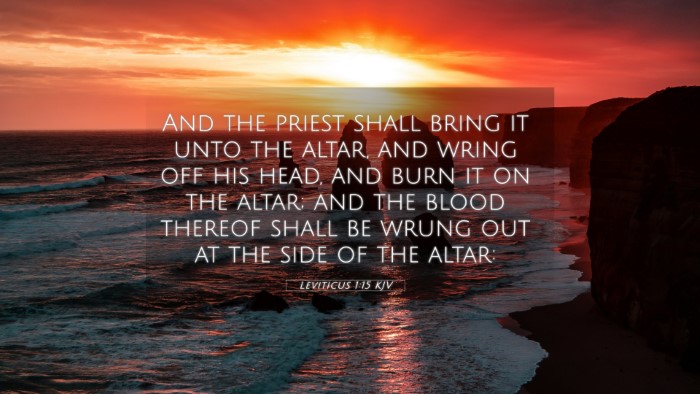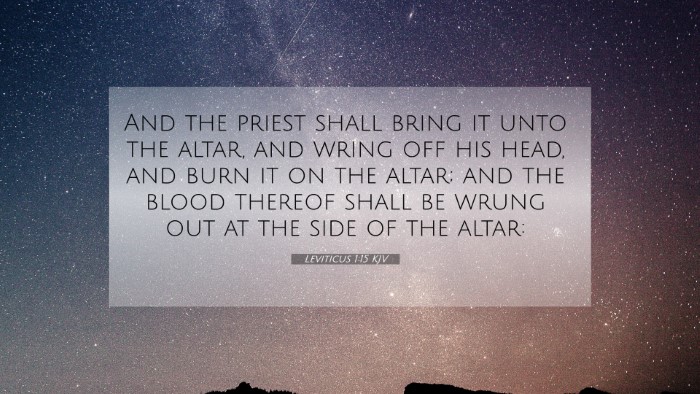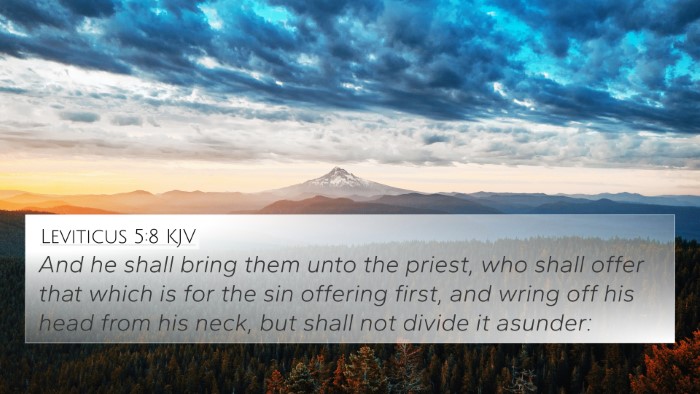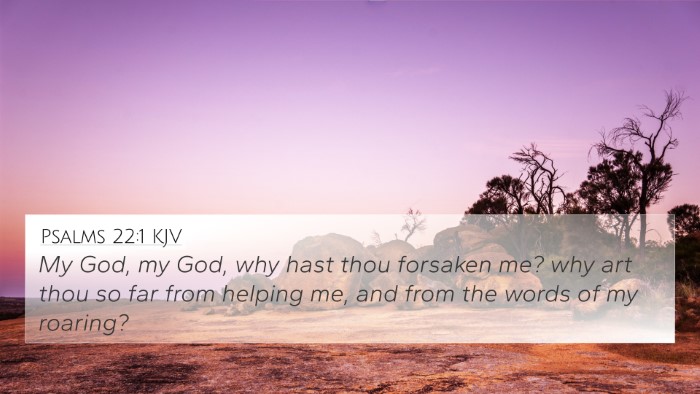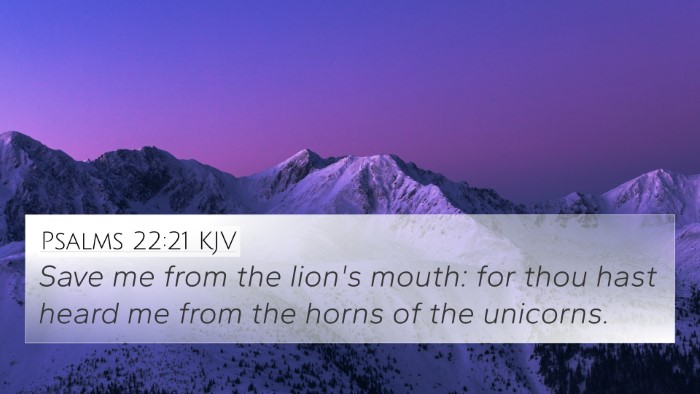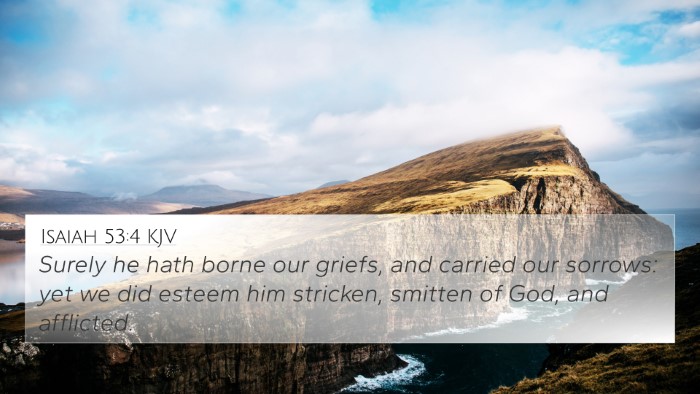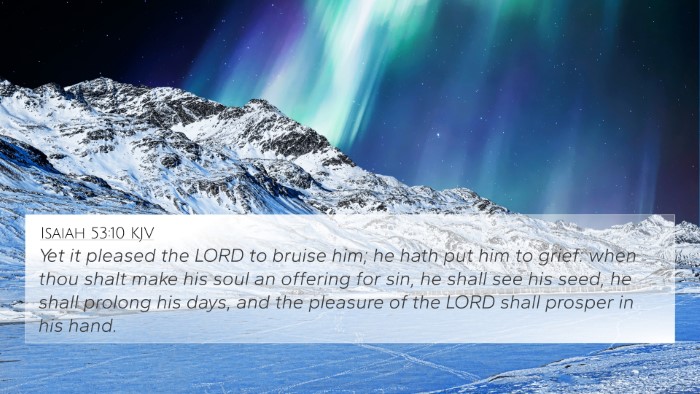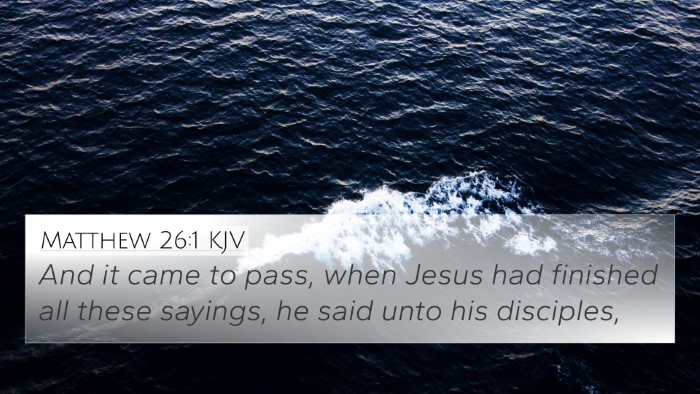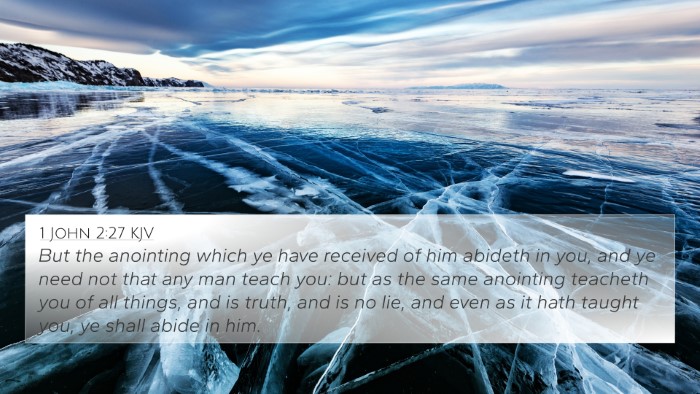Understanding Leviticus 1:15
Bible Verse: Leviticus 1:15
Verse: "And the priest shall bring it unto the altar, and wring off his head, and burn it on the altar; and the blood thereof shall be wrung out at the side of the altar." (KJV)
Context and Significance
Leviticus 1:15 is part of a broader instruction regarding burnt offerings, detailing the process in which the priest performs the sacrificial rite. This verse emphasizes the role of the priest and the ritualistic aspects of approaching God through sacrifice.
Summarized Insights from Public Domain Commentaries
Matthew Henry: Matthew Henry discusses the importance of sacrifices in the Old Testament, noting that the burnt offering is a symbol of complete surrender to God. The act of wringing off the head and burning it signifies the totality of the sacrifice, focusing on the offering pleasing to God, emphasizing that it represents an atonement for sin and a means of approaching God with reverence.
Albert Barnes: Barnes elaborates on the priest's role, highlighting the execution of the offering as pivotal to ensuring the proper worship of God under the Mosaic Law. The blood, once again, represents life and atonement. The detail of the blood being wrung out signifies the seriousness of this covenant relationship between God and His people.
Adam Clarke: Clarke adds that the act of the priest receiving the offering serves as a mediation between the offerer and God. The reference to the side of the altar denoting the location of where the blood is poured out indicates both the setting apart of the offering and the acknowledgment of atonement being made for the individual making the sacrifice. Clarke also notes the spiritual implications of the ritual, stating that the meticulous process reflects the holiness required in worship.
Connections Between Bible Verses
Leviticus 1:15 connects with various other scripture passages that elucidate sacrificial laws, priestly duties, and the concept of atonement, enriching the understanding of the spiritual implications of such offerings.
- Hebrews 9:22: "And almost all things are by the law purged with blood; and without shedding of blood is no remission." This verse highlights the necessity of blood in the process of atonement, paralleling the importance in Leviticus 1:15.
- Exodus 29:16: "And you shall kill the ram, and you shall take its blood and sprinkle it on the altar round about." This reinforces the role of blood in sacrifices.
- Leviticus 17:11: "For the life of the flesh is in the blood: and I have given it to you upon the altar to make an atonement for your souls." This directly connects to the sacrificial system outlined in Leviticus.
- 1 Peter 1:19: "But with the precious blood of Christ, as of a lamb without blemish and without spot." This reflects the transition from Old Testament sacrifices to the ultimate sacrifice of Christ.
- Romans 12:1: "I beseech you therefore, brethren, by the mercies of God, that ye present your bodies a living sacrifice, holy, acceptable unto God." This draws a thematic connection between living sacrifices and the principles behind burnt offerings.
- Leviticus 4:27-31: Discusses the offering for sin, showing the consistency in the sacrificial principles of atonement.
- Matthew 5:23-24: Jesus speaks on reconciling with others before offering to God, tying the need for atonement back to interpersonal relationships and sacrifice.
Thematic Bible Verse Connections
The thematic connections present within Leviticus 1:15 showcase a larger narrative through both the Old and New Testaments regarding sacrifice, atonement, and the holiness required in worship. Understanding these connections allows for a deeper insight into the implications of sacrifice and worship.
The process described is not merely ritualistic; it represents a deep journey of acknowledgment of sin and the need for purification. The involvement of the priest as a mediator emphasizes the role of Christ in the New Testament as the Great High Priest who offers Himself as the ultimate sacrifice.
Practical Applications and Reflections
Reflecting on Leviticus 1:15 can lead to personal applications concerning our own 'sacrifices' and offerings to God today. The meticulous nature of Old Testament sacrifices can inspire believers to consider how they approach God in worship and the seriousness of sin in their lives.
Engaging with this verse encourages individuals to explore the ways that God desires to engage with His people not only through formal worship but also through a heart aligned with Him.
Conclusion
Leviticus 1:15 serves as a vital element in understanding the broader context of worship, sacrifice, and the narrative of atonement demonstrated throughout scripture. It invites believers to delve deeper into their relationship with God and nuggets of understanding that enrich their faith.

